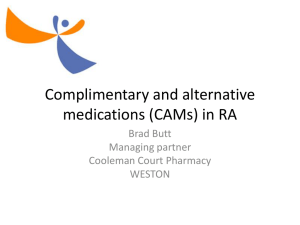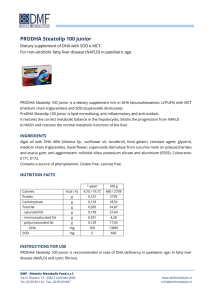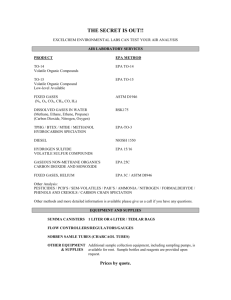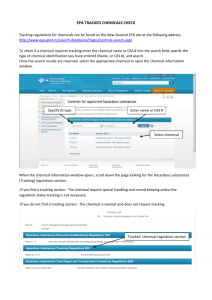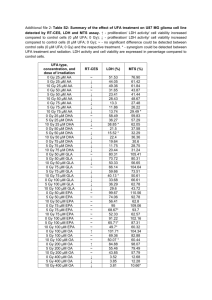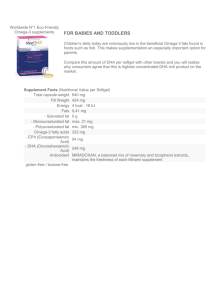Triglycerides_and_Omega_3s
advertisement
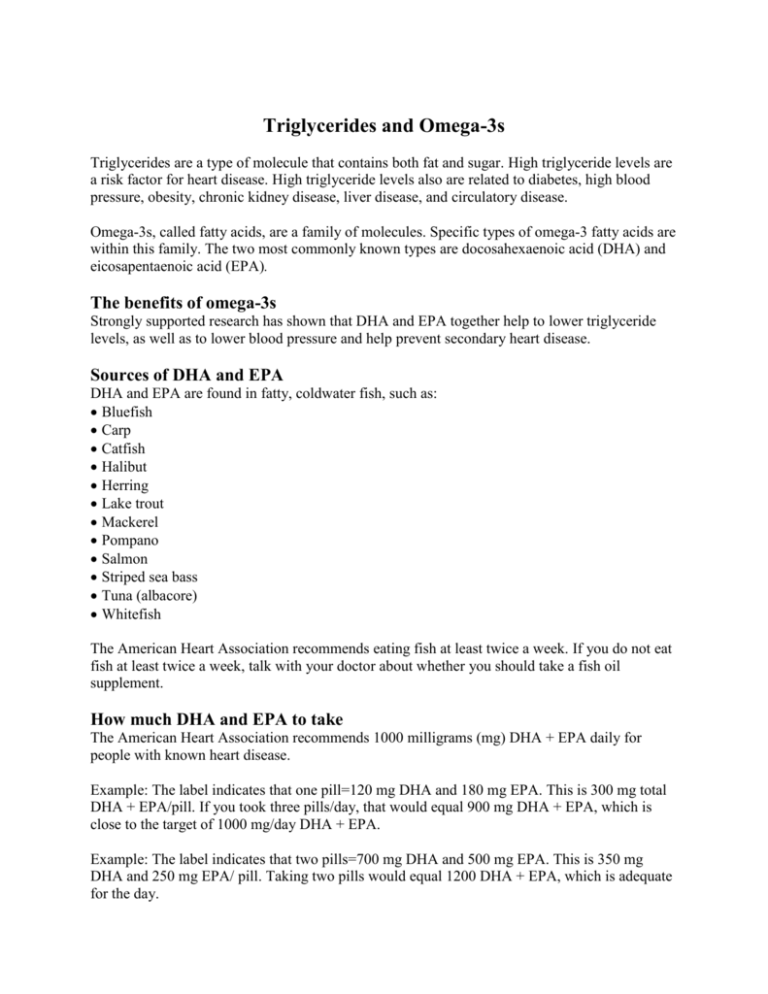
Triglycerides and Omega-3s Triglycerides are a type of molecule that contains both fat and sugar. High triglyceride levels are a risk factor for heart disease. High triglyceride levels also are related to diabetes, high blood pressure, obesity, chronic kidney disease, liver disease, and circulatory disease. Omega-3s, called fatty acids, are a family of molecules. Specific types of omega-3 fatty acids are within this family. The two most commonly known types are docosahexaenoic acid (DHA) and eicosapentaenoic acid (EPA). The benefits of omega-3s Strongly supported research has shown that DHA and EPA together help to lower triglyceride levels, as well as to lower blood pressure and help prevent secondary heart disease. Sources of DHA and EPA DHA and EPA are found in fatty, coldwater fish, such as: Bluefish Carp Catfish Halibut Herring Lake trout Mackerel Pompano Salmon Striped sea bass Tuna (albacore) Whitefish The American Heart Association recommends eating fish at least twice a week. If you do not eat fish at least twice a week, talk with your doctor about whether you should take a fish oil supplement. How much DHA and EPA to take The American Heart Association recommends 1000 milligrams (mg) DHA + EPA daily for people with known heart disease. Example: The label indicates that one pill=120 mg DHA and 180 mg EPA. This is 300 mg total DHA + EPA/pill. If you took three pills/day, that would equal 900 mg DHA + EPA, which is close to the target of 1000 mg/day DHA + EPA. Example: The label indicates that two pills=700 mg DHA and 500 mg EPA. This is 350 mg DHA and 250 mg EPA/ pill. Taking two pills would equal 1200 DHA + EPA, which is adequate for the day. For people who need to lower their triglyceride levels, higher levels of DHA + EPA are recommended. The American Heart Association recommends 2000-4000 mg DHA + EPA/day for those with documented high triglyceride levels. Caution: The US Food and Drug Administration (FDA) considers up to 3000 mg DHA + EPA as safe. However, anyone taking more than 3000 mg DHA + EPA should do so only under the direct supervision of a physician. Choosing a fish oil supplement First, look for a supplement that will provide the appropriate dose of DHA + EPA (see previous section). It is also important to look for supplements that contain a balanced mixture of DHA + EPA. Choose a mixture that is as close to 50% DHA, 50% EPA as possible. For example, a supplement containing 160 mg DHA and 140 mg EPA is a good choice (55% DHA, 45% EPA). A supplement containing 50 mg DHA and 250 mg EPA is not as good of a choice (15% DHA, 85% EPA). It is also important to make sure the oil is coming from fish sources. Read the ingredient label to find out where the oil is coming from. Gastrointestinal side effects The following suggestions may help to limit the gastrointestinal side effects of taking fish oil supplements: Start taking fish oil supplements at a low dose, gradually increasing to the recommended dose Take fish oil supplements with meals Freeze fish oil capsules to help decrease gastrointestinal side effects (helpful for some people) Mercury levels Mercury accumulates in the meat of fish, but not as much in the oil. Therefore, fish oil supplements generally do not contain mercury. Who should not take fish oil supplements You should always let your doctor(s) know all of the supplements you are taking, including dosage information. Do not start taking fish oil supplements until you have talked with your doctor(s). Do not take fish oil supplements if you pregnant or breastfeeding, or if you have: Fish allergy or hypersensitivity to fish Chronic low blood pressure Congestive heart failure Chronic recurrent angina Any conditions that indicate the heart is receiving insufficient blood flow High levels of low-density lipoprotein (LDL) References American Heart Association. Resources for healthcare professionals. Available at: http://www.americanheart.org/presenter.jhtml?identifier=3052043. Accessed April 14, 2010. MedlinePlus. Omega-3 fatty acids, fish oil, alpha-linolenic acid. Available at: http://www.nlm.nih.gov/medlineplus/druginfo/natural/patient-fishoil.html. Accessed April 15, 2010. Contributed by Emily Workman, RD Review Date 4/10 G-1320
